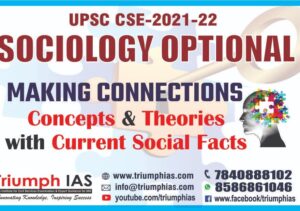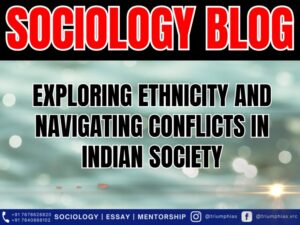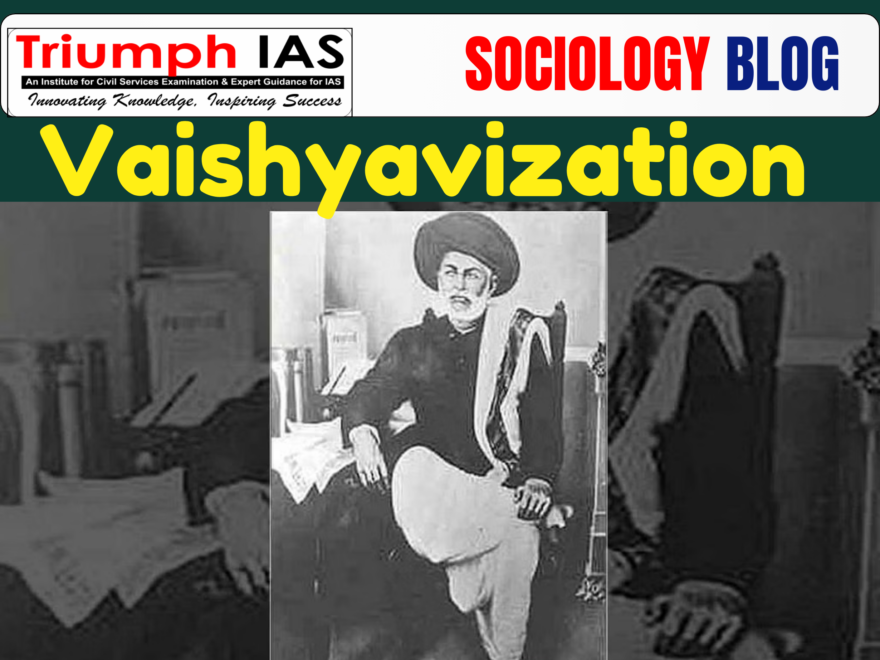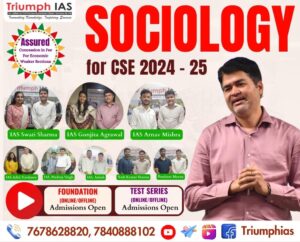Vaishyavization
Relevant for Sociology Optional for Civil Service Examination.
Paper -2 : Unit – Caste System
Vaishyavization

- Vaishyavization, introduced by R. Vaidyanathan in his book “Caste as Social Capital,” is a newer concept that emphasizes the socio-economic dimensions of caste. This perspective delves into the intricacies of caste dynamics through the lenses of business, economics, and entrepreneurship, scrutinizing the impact of caste on capital market access and the perpetuation of caste-based inequalities.
- In contrast to traditional views, Vaishyavization presents caste as a positive institution with multifaceted roles. It is seen as a source of social cohesion, economic lubrication, and social capital, suggesting that caste plays a constructive role in various aspects of society. This departure from the conventional focus on ritual status enables a more nuanced understanding of caste within the socio-economic context of modern India.
- Derived from the term “Vaishya,” which denotes the merchant caste in the traditional Hindu caste system, Vaishyavization is distinct from “Sanskritization.” While Vaishyavization emphasizes the socio-economic aspects of caste, Sanskritization is a cultural process wherein lower castes adopt the Brahminic way of life to elevate their social status.
CASTE CONFLICT
Forms of Inter-Caste Conflicts:
- Competition: Inter-caste competition for resources like land, jobs, and business opportunities can lead to conflicts and disputes over access to these resources.
- Social Discrimination: Discrimination based on caste status in areas like education, housing, healthcare, and employment can result in conflicts. An example is Manusmriti prescribing different degrees of punishment for the same crime based on caste.
- Political Power Struggles: Conflicts arise when different castes compete for political power and representation, including disputes over resource distribution.
- Cultural Clashes: Differences in customs, traditions, and beliefs among different castes can lead to conflicts over issues such as marriage, religious practices, and cultural expressions.
- Violence: Conflicts over economic, social, political, and cultural issues can turn violent, resulting in physical attacks, murders, and other forms of violence.
- Identity Issues: Conflicts can arise when individuals or groups strongly identify with their own caste, leading to disputes over representation, cultural practices, and political power.
- Access to Public Services: Barriers in accessing public services like healthcare, education, and justice can lead to conflicts.
- Land Rights: Conflicts may emerge due to differences in land ownership and usage rights among different castes.
- Labour Relations: Unequal treatment in the workplace based on caste can result in labor-related conflicts.
- Reservation Policies: Differences in access to government-reserved quotas, such as education and employment opportunities, can lead to disputes.
Sociologist Viewpoints on Inter-Caste Conflicts:
- Yogendra Singh: He discusses the tension created by various agents of social change in Indian society, leading to restructuring. These restructuring results in downward mobility for upper castes and upward mobility for lower castes.
- Inter-caste violence is driven by conflicts related to ideology, structure, and culture. He says the ideology, structure and culture of Indian society is facing ‘tension’ from various agents of social changes –law, economy, planned development, technology.
- Dipankar Gupta: Gupta highlights the social, economic, political, and cultural dimensions of inter-caste conflicts, reflecting the modern state’s impact on traditional society. For example Inter-caste marriages are legally protected, but there is cultural lag in society .
- MN Srinivas: Srinivas suggests that inter-caste conflicts are the result of competition for resources and status among different castes, with lower castes attempting to improve their social status by adopting higher-caste customs.
Louis Dumont: Dumont argues that the rigid hierarchy of the caste system, with little room for social mobility, leads to inter-caste conflicts as lower castes seek to move up the hierarchy, facing resistance from higher castes who perceive this as a threat to their dominance.
Reference: Static Portion
Related Blogs…
 |
 |
Frequently Asked Questions:
1. Question: Define the term “ethnic movement” and provide an example from India.
Answer: An ethnic movement refers to a collective effort by a group sharing common cultural, linguistic, or religious traits, seeking to assert their identity and rights; an example from India is the Khalistan Movement in Punjab.
2. Question: Identify the main objectives behind the Gorkhaland ethnic movement.
Answer: The Gorkhaland ethnic movement primarily seeks to establish a separate state for India’s Nepali-speaking population in the Darjeeling region, advocating for linguistic and cultural recognition and political autonomy.
3. Question: What was the Operation Blue Star, and which ethnic movement was it related to?
Answer: Operation Blue Star was a military action in 1984, aiming to remove Sikh militants hiding in the Golden Temple in Amritsar; it is related to the Khalistan movement, which sought a separate Sikh country.
4. Question: Mention a critical factor that triggered the emergence of ethnic movements in India, as discussed by Dipankar Gupta.
Answer: Dipankar Gupta emphasized that ethnicity is fundamentally a political process, wherein caste and religion, the key components of identity formation, are politicized by leaders for vested interests.
5. Question: What were the primary reasons for the Assam Ethnicity conflicts involving Bodo tribals and Bengali Muslim settlers?
Answer: The Assam Ethnicity conflicts primarily stemmed from issues related to immigration, land rights, and resource allocation, leading to clashes, riots, and evolving relationships among indigenous communities to address challenges.
6. Question: Briefly describe the role of the Dravidian Movement in terms of caste and societal structure.
Answer: The Dravidian Movement, led notably by E.V. Ramasamy, aimed to establish an egalitarian society, focusing on anti-Brahmanism and advocating for equal rights for backward castes, while also introducing reforms like self-respect marriages.
7. Question: Name the prominent ethnic movements in North-East India and specify one common objective.
Answer: Prominent ethnic movements in North-East India include the Nagas’ and Mizos’ struggles; a common objective was to gain autonomy and recognition for their distinct tribal identities and cultural uniqueness.
8. Question: What is the key argument of Gail Omveldt regarding traditional Indian society and multiculturalism?
Answer: Gail Omveldt opposed romanticizing traditional Indian society, arguing that hierarchy has always dominated it and dismissing the notion that multiculturalism is an intrinsic feature of Indian society as a myth.
9. Question: Briefly explain the social hierarchy factor as a contributing element to ethnic movements as suggested by Olzak.
Answer: Olzak suggests that the construction of hierarchies among ethnic communities, which often leads to the suppression of one group by another, is a key factor that can instigate social and ethnic movements.
10. Question: Identify one consequence of the unequal economic development factor within the context of ethnic movements in India.
Answer: One consequence of unequal economic development is the marginalization and underdevelopment of certain groups, leading to feelings of alienation and sometimes initiating ethnic movements as these groups strive for equality and recognition.
GS Related Practices Questions…
To master these intricacies and fare well in the Sociology Optional Syllabus, aspiring sociologists might benefit from guidance by the Best Sociology Optional Teacher and participation in the Best Sociology Optional Coaching. These avenues provide comprehensive assistance, ensuring a solid understanding of sociology’s diverse methodologies and techniques.
META TAGS:
Ethnic Movements, ethnic movements in india, ethnic movement in sociology, Punjab Movement, North-East Ethnic Movements, Gorkhaland Movement, Dravidian Movement, Assam Ethnicity, Ethnic Conflicts, Sociopolitical Impact, India, Ethnic Consciousness, Ethnic Rights, Political Crisis, Economic Development, Cultural Disparities, Khalistan Movement, Nagaland, Mizoram, Multiculturalism, Political Economy, Identity Formation, Social Hierarchies, Bodo Tribals, Bengali Muslim Settlers, Anti-Sikh Riots, Operation Blue Star, Unequal Development, Ethnic Violence, Political Mobilization

Why Vikash Ranjan’s Classes for Sociology?
Proper guidance and assistance are required to learn the skill of interlinking current happenings with the conventional topics. VIKASH RANJAN SIR at TRIUMPH IAS guides students according to the Recent Trends of UPSC, making him the Best Sociology Teacher for Sociology Optional UPSC.
At Triumph IAS, the Best Sociology Optional Coaching platform, we not only provide the best study material and applied classes for Sociology for IAS but also conduct regular assignments and class tests to assess candidates’ writing skills and understanding of the subject.
Choose The Best Sociology Optional Teacher for IAS Preparation?
At the beginning of the journey for Civil Services Examination preparation, many students face a pivotal decision – selecting their optional subject. Questions such as “which optional subject is the best?” and “which optional subject is the most scoring?” frequently come to mind. Choosing the right optional subject, like choosing the best sociology optional teacher, is a subjective yet vital step that requires a thoughtful decision based on facts. A misstep in this crucial decision can indeed prove disastrous.
Ever since the exam pattern was revamped in 2013, the UPSC has eliminated the need for a second optional subject. Now, candidates have to choose only one optional subject for the UPSC Mains, which has two papers of 250 marks each. One of the compelling choices for many has been the sociology optional. However, it’s strongly advised to decide on your optional subject for mains well ahead of time to get sufficient time to complete the syllabus. After all, most students score similarly in General Studies Papers; it’s the score in the optional subject & essay that contributes significantly to the final selection.
“A sound strategy does not rely solely on the popular
Opinion of toppers or famous YouTubers cum teachers.”
It requires understanding one’s ability, interest, and the relevance of the subject, not just for the exam but also for life in general. Hence, when selecting the best sociology teacher, one must consider the usefulness of sociology optional coaching in General Studies, Essay, and Personality Test.
The choice of the optional subject should be based on objective criteria, such as the nature, scope, and size of the syllabus, uniformity and stability in the question pattern, relevance of the syllabic content in daily life in society, and the availability of study material and guidance. For example, choosing the best sociology optional coaching can ensure access to top-quality study materials and experienced teachers. Always remember, the approach of the UPSC optional subject differs from your academic studies of subjects. Therefore, before settling for sociology optional, you need to analyze the syllabus, previous years’ pattern, subject requirements (be it ideal, visionary, numerical, conceptual theoretical), and your comfort level with the subject.
This decision marks a critical point in your UPSC – CSE journey, potentially determining your success in a career in IAS/Civil Services. Therefore, it’s crucial to choose wisely, whether it’s the optional subject or the best sociology optional teacher. Always base your decision on accurate facts, and never let your emotional biases guide your choices. After all, the search for the best sociology optional coaching is about finding the perfect fit for your unique academic needs and aspirations.
To master these intricacies and fare well in the Sociology Optional Syllabus, aspiring sociologists might benefit from guidance by the Best Sociology Optional Teacher and participation in the Best Sociology Optional Coaching. These avenues provide comprehensive assistance, ensuring a solid understanding of sociology’s diverse methodologies and techniques. Sociology, Social theory, Best Sociology Optional Teacher, Best Sociology Optional Coaching, Sociology Optional Syllabus.
Best Sociology Optional Teacher, Sociology Syllabus, Sociology Optional, Sociology Optional Coaching, Best Sociology Optional Coaching, Best Sociology Teacher, Sociology Course, Sociology Teacher, Sociology Foundation, Sociology Foundation Course, Sociology Optional UPSC, Sociology for IAS,
Follow us :
🔎 https://www.instagram.com/triumphias
🔎https://www.youtube.com/c/TriumphIAS
🔎https://t.me/VikashRanjanSociology
Find More Blogs…
| Compare and contrast Karl Marx’s and Max weber’s | Karl Marx- Historical Materialism |
| Talcott Parsons : Social system | Scope of the subject and comparison with other social sciences |
KEYWORD: Vaishyavization,Vaishyavization,Vaishyavization,Vaishyavization,Vaishyavization,Vaishyavization,Vaishyavization,Vaishyavization,Vaishyavization,Vaishyavization,Vaishyavization,Vaishyavization,Vaishyavization,Vaishyavization,Vaishyavization,Vaishyavization


